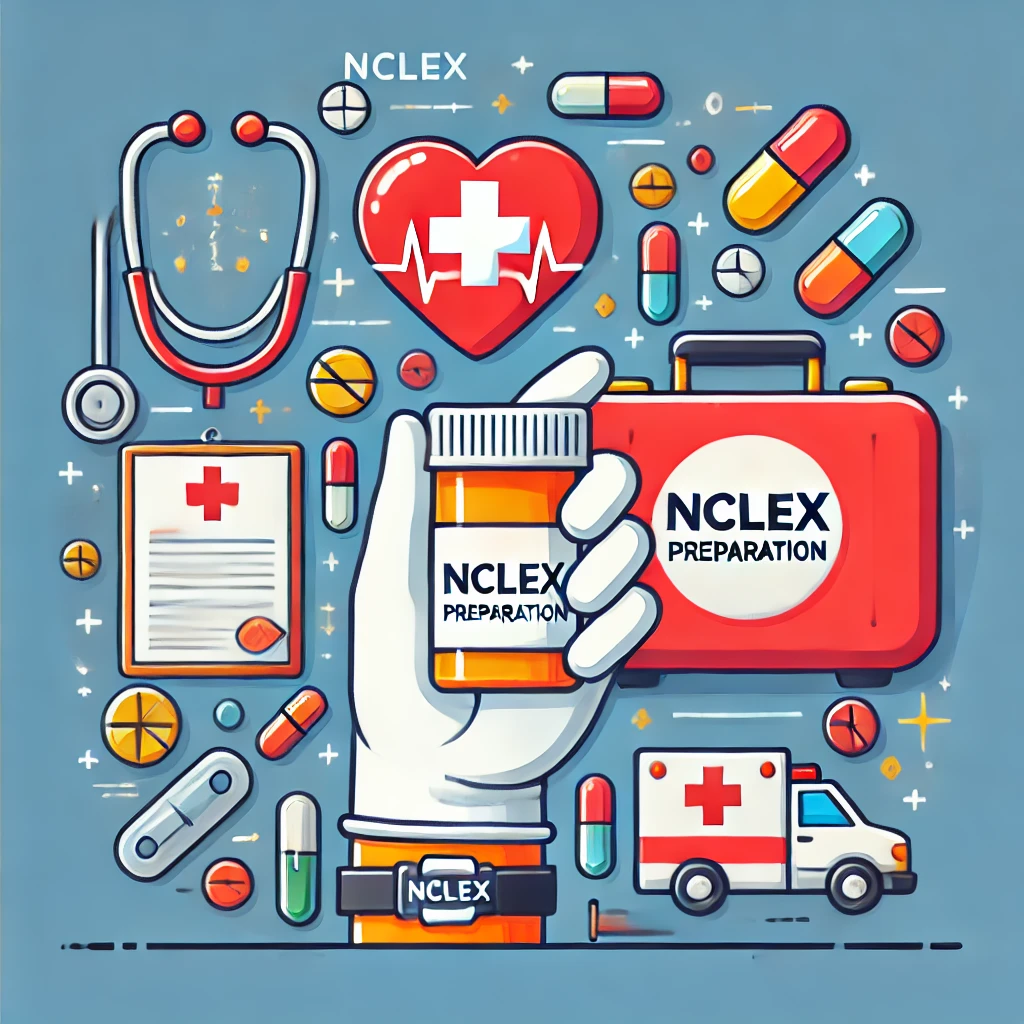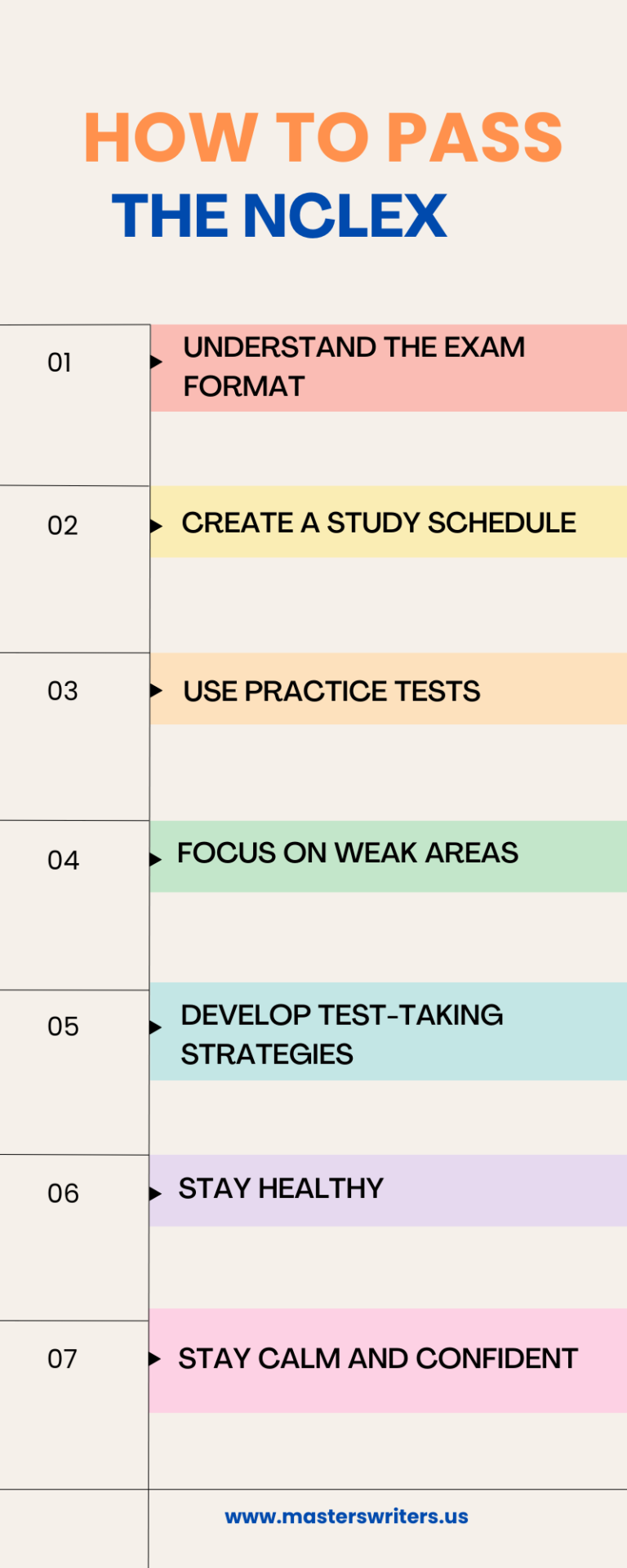Nursing
How to Pass the NCLEX: Tips, FAQs & More


Passing the NCLEX (National Council Licensure Examination) is crucial for aspiring nurses to obtain their licensure and begin their professional careers. This comprehensive exam evaluates the knowledge, skills, and abilities essential for safe and effective entry-level nursing practice. With the stakes so high, preparation is vital. This article will guide you through everything you need to know to pass the NCLEX, from understanding the exam format and difficulty to effective study strategies and tips for staying calm on test day. Whether you’re a recent nursing school graduate or a seasoned professional looking to re-enter the field, these insights will help you approach the NCLEX with confidence and a solid plan for success.
In the following sections, we will delve into the specifics of the NCLEX exam, discuss its challenges, and provide a step-by-step guide on preparing and excelling. From creating a study schedule to focusing on your weak areas and using practice tests effectively, we’ve got you covered. Additionally, we’ll address common questions and concerns about the NCLEX to ensure you have all the information you need to succeed. Let’s get started on your journey to becoming a licensed nurse.
What is the NCLEX Exam
The NCLEX is a standardized test that nursing graduates must pass to obtain their nursing license. Administered by the National Council of State Boards of Nursing (NCSBN), the exam assesses the knowledge, skills, and abilities essential for safe and effective entry-level nursing practice. There are two types of NCLEX exams:
- The NCLEX-RN for registered nurses
- The NCLEX-PN for practical/vocational nurses.

Exam Prep Doesn't Have to Be Solitary!
Let us support you through this nerve-wracking process and professionally write your papers!
How Hard is the NCLEX
The NCLEX is widely regarded as a challenging exam due to its comprehensive and adaptive nature. The difficulty of the NCLEX stems from its format, which uses computer adaptive testing (CAT) to tailor questions based on the test-takers ability level. With each question answered correctly, the subsequent questions become increasingly complex, ensuring that only those with a thorough understanding of nursing concepts pass. Additionally, the exam covers a broad range of topics, including pharmacology, patient care, and ethical/legal issues, requiring test-takers to have a well-rounded and in-depth knowledge of nursing. The pressure of high stakes, combined with the need for critical thinking and application of knowledge, makes the NCLEX a rigorous and demanding test for many aspiring nurses.
How Long is the NCLEX
The NCLEX exam duration varies, with a maximum of five hours for the NCLEX-RN and NCLEX-PN, including optional breaks. The number of questions also ranges from 75 to 145, depending on how quickly the test-taker demonstrates their competency. This adaptive nature ensures a thorough assessment of the candidate’s nursing abilities.
How to Pass the NCLEX
Passing the NCLEX requires a strategic and well-rounded approach to preparation. This section explores key strategies to help you succeed, from understanding the exam format and creating an effective study schedule to using practice tests and focusing on your weak areas. By developing test-taking strategies and maintaining a healthy, calm mindset, you’ll be well-equipped to tackle the NCLEX confidently.

Understand the Exam Format
To succeed on the NCLEX, it’s crucial to familiarize yourself with its format beforehand. The NCLEX employs a Computer Adaptive Testing (CAT) format, meaning the exam adjusts the difficulty of questions based on your responses. Here’s what you should know:
Question Types: The NCLEX features a variety of question formats, including multiple-choice, multiple-response, fill-in-the-blank, hot spots (clicking on an image), drag-and-drop (ordering or categorizing items), and audio clips. Understanding these formats will help you feel more comfortable on test day.
Number of Questions: You will encounter between 75 and 145 questions, with 15 being unscored pretest items. The number of scored questions ranges from 60 to 130, depending on how quickly you demonstrate your competency.
Time Limit: You have up to five hours to complete the exam, which includes a tutorial at the beginning and two optional breaks. The first break is scheduled after two hours, and the second occurs after three and a half hours of testing.
Create a Study Schedule
Developing a structured study schedule is essential for effectively preparing for the NCLEX. A well-organized plan ensures you cover all necessary content systematically, reducing the risk of feeling overwhelmed. Here’s how to create a productive study routine:
- Track Your Progress: Monitor your study sessions, practice tests, and critical dates.
- Diverse Study Methods: Mix your study techniques with reading, watching videos, and practicing questions to keep your learning engaging.
- Self-Care: Ensure you get adequate sleep, eat well, and take regular breaks to prevent burnout.
Sample Study Schedule
| Week 1-2 🗓️ | Week 3-4 🗓️ |
Monday | Focus: Review infection control notes 📋 | Focus: Study health promotion topics 📖 |
Tuesday | Focus: Safe and Effective Care Environment 🏥 | Focus: Health Promotion and Maintenance 🌿 |
Wednesday | Focus: Safety and Infection Control 📚 | Focus: Growth and Development 📚 |
Thursday | Focus: Management of Care 📖 | Focus: Disease Prevention 🏥 |
Friday | Practice Questions: Safety and Infection Control 📝 | Practice Questions: Health Promotion 📝 |
Saturday | Practice Questions: Management of Care 📝 | Practice Questions: Growth and Development 📝 |
Sunday | Review: Notes and Mini Practice Test 🧠 | Review: Notes and Mini Practice Test 🧠 |
Use Practice Tests
Incorporating practice tests into your study routine is a powerful strategy to master the NCLEX exam format and enhance your test-taking skills. They boost your confidence and improve your time management, making the exam experience more manageable. Here’s how to effectively use practice tests in your NCLEX preparation:
- Simulate Exam Conditions: Take practice tests in a quiet, distraction-free environment to mimic test conditions.
- Time Management: Time yourself to get accustomed to the NCLEX’s pacing and time constraints.
- Thorough Review: Analyze each practice test to identify your strengths and weaknesses.
- Identify Weak Areas: Focus on the questions and content areas where you struggle.
- Understand Explanations: Read the explanations for correct and incorrect answers to understand each question’s reasoning.
- Build Stamina: Regularly take full-length practice exams to build the endurance needed for the actual test.
- Track Progress: Record your scores to monitor your improvement over time.
- Adjust Study Plan: Use your performance data to adjust your study focus on areas needing more attention.
- Diversify Sources: Use practice tests from various sources to experience various question styles and difficulty levels.
Focus on Weak Areas
Concentrating on your weak areas is crucial for passing the NCLEX on your first attempt and ensuring comprehensive preparation. This approach transforms your weaknesses into strengths, boosting your confidence and capability on exam day.
Tip | Description |
Identify Your Weaknesses 🔍 | Analyze your practice test results to find areas where you consistently struggle. Pay attention to specific question types and content areas with frequent mistakes. |
Prioritize Study Time ⏰ | Allocate more study sessions to these weak areas. For instance, if pharmacology is challenging, spend extra time on drug classifications, mechanisms, and side effects. |
Use Targeted Resources 📚 | Utilize resources tailored to your weak areas, such as specialized textbooks, online courses, and review guides. Enhance your learning with flashcards, videos, and interactive tools. |
Practice Specific Questions 📝 | Focus on practice questions and case studies related to your weak areas to improve your problem-solving skills in those topics. |
Review and Reflect 🔄 | After studying a weak area, evaluate your progress with related practice questions or quizzes. Reflect on any errors and ensure you understand the correct answers. |
Seek Help if Needed 🆘 | If certain concepts remain challenging, seek assistance from a peer, instructor, or tutor. Join study groups or online forums for support and different perspectives. |
Develop Test-Taking Strategies
Effective test-taking strategies can significantly enhance your performance on the NCLEX by helping you handle challenging questions, manage your time efficiently, and maintain focus throughout the exam. Here are some essential strategies:
- Read Questions Thoroughly: Carefully read each question and all the answer choices before selecting. Pay attention to key terms like “most,” “first,” “best,” and “except,” as they can alter the question’s meaning.
- Use Process of Elimination: Remove incorrect answers to narrow down your choices. This technique increases your chances of choosing the correct answer, even if it is uncertain.
- Prioritize Patient Safety: Always consider patient safety first. Many NCLEX questions assess your ability to prioritize safe and effective care.
- Look for Clues: Identify clues in the question that can guide you to the correct answer. The wording of the question can often provide hints.
- Manage Your Time Wisely: Keep track of time, but avoid rushing. Pace yourself to ensure you have sufficient time for each question. If a question is too difficult, mark it and return to it later.
- Stay Calm Under Pressure: When faced with a tough question, take a deep breath and stay composed. Use relaxation techniques such as deep breathing to manage stress during the exam.
- Practice Critical Thinking: The NCLEX tests your critical thinking and decision-making skills rather than factual knowledge. Engage in scenario-based questions and case studies to hone these abilities.
Stay Healthy
Maintaining your physical and mental well-being is crucial for optimal concentration, memory retention, and overall performance on the NCLEX. Being in your best condition will help you stay alert and ready for the exam.
- Prioritize Sleep: Ensure you get 7-9 hours each night, especially as the exam approaches. Quality sleep enhances memory and reduces stress.
- Eat Nutritiously: Follow a balanced diet of fruits, vegetables, lean proteins, and whole grains. Limit your intake of caffeine and sugar to avoid energy crashes.
- Stay Hydrated: Keep yourself hydrated by drinking plenty of water throughout the day. Dehydration can negatively affect cognitive functions and concentration.
- Exercise Regularly: Include regular physical activity, such as walking, jogging, or yoga. Exercise helps reduce stress and increases mood and energy levels.
- Take Study Breaks: Incorporate short breaks during study sessions to rest and rejuvenate. Use these breaks to engage in relaxing or enjoyable activities.
- Practice Relaxation: Use relaxation techniques like deep breathing, meditation, or progressive muscle relaxation to manage anxiety and stay calm.
- Prevent Burnout: To avoid burnout, balance your study time with leisure activities and social interactions. Engage in hobbies and activities you enjoy to help you relax and unwind.
Stay Calm and Confident
Maintaining calmness and confidence is essential for clear thinking and optimal performance on the NCLEX. Anxiety can cloud your judgment and affect your ability to answer questions accurately. Here are some tips to help you stay composed and self-assured, steps to be a nurse practitioner:
- Positive Affirmations: Remind yourself of your hard work and preparation with positive affirmations.
- Visualization: Picture yourself completing the exam successfully.
- Preparation Equals Confidence: Confidence stems from thorough preparation. Stick to your study schedule and ensure you cover all necessary material.
- Focus on One Question at a Time: Concentrate on each question individually rather than stressing over the entire exam.
- Let Go of Past Questions: Avoid dwelling on questions you may have answered incorrectly.
- Practice Mindfulness: Techniques such as deep breathing, meditation, and mindfulness exercises can help you stay present and calm.
- Pre-Exam Preparation: Prepare everything you need the night before, including your ID, snacks, and comfortable clothing.
- Arrive Early: Arrive at the testing center early to give yourself time to relax and settle in.
5 More NCLEX Study Tips
Tip | Description |
Keep It Simple 📝 | Don’t overthink the questions. The NCLEX assesses your entry-level nursing knowledge and critical thinking skills. Read each question carefully and answer based on your foundational understanding, avoiding hidden meanings. |
Recognize Key Words 🔑 | Focus on specific words that can guide you to the correct answer. Words like “always” or “never” often indicate a potentially incorrect response. Look for negatives like “not” in the question to help determine the right choice. |
Use the Process of Elimination 🚫 | Immediately discard any answers you know are incorrect. This method improves your chances of selecting the correct answer from the remaining options. |
Manage Your Time ⏳ | If you find yourself stuck on a question, spend no more than two minutes on it. Choose your best answer and move on. Answering more questions is more effective than getting bogged down by one difficult question. |
Trust Your Preparation 🌟 | Have confidence in the effort you’ve put into studying. Trust that your preparation has equipped you to handle the questions and rely on your knowledge and instincts. |
Final Remarks
After finishing the NCLEX, maintain a positive outlook while waiting for your results. Scores are not available immediately at the test center; your state board of nursing will notify you of your results approximately six weeks after taking the exam. If you do not pass on your first attempt, you’ll receive a detailed performance report to guide your preparation for the next try. Remember, expert assistance is available for essay writing and other academic needs. Stay optimistic and prepare to embark on your nursing career by successfully passing the NCLEX!

Feeling the Pressure of Upcoming Exams?
Let us handle your study load while you focus on calming your nerves!
FAQs
What is the NCLEX exam for?
The NCLEX exam determines if a nursing graduate has the necessary knowledge, skills, and abilities to practice nursing safely and effectively at an entry level. The NCLEX is required to obtain a nursing license in the United States and Canada.
Is the NCLEX easy to pass?
The NCLEX is considered challenging due to its comprehensive coverage and adaptive testing format. While some may find it manageable with thorough preparation, others may find it difficult. Success largely depends on one’s level of preparation and understanding of nursing concepts.
Can I take the NCLEX without going to nursing school?
No. You cannot take the NCLEX without graduating from an accredited nursing program. Completing a nursing program is a prerequisite to being eligible to sit for the NCLEX exam.
Is NCLEX a hard test?
Yes. The NCLEX is often described as difficult due to its adaptive nature and broad range of topics. The test adjusts the difficulty of questions based on your performance, and it requires a solid understanding of nursing concepts and critical thinking skills. However, with proper preparation and study, many candidates can pass successfully.
Sources
NCLEX. Prepare for Success: What You Need to Know to Prepare for the NCLEX. https://www.nclex.com/prepare.page
Nursing Education. How to Pass The NCLEX-RN: 7 Key Tips. https://nursingeducation.org/resources/preparing-for-the-nclex/

